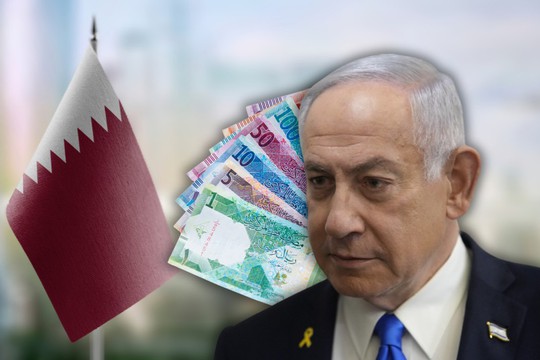Prime Minister Benjamin Netanyahu
Photo: ‘The Jerusalem Post’
Indeed, a large portion of the criticism of Prime Minister Benjamin Netanyahu when it comes to the current war is a consistent claim among his detractors is that he “allowed” this war to come about by permitting the transferring of Qatari funds, better known in Israel as “briefcases of money,” through Israel.
Qatari funding of the terrorist organization Hamas – and also the Israeli government and its partners – has been a consistent rumor, writes ‘The Jerusalem Post’.
Now, the story we know as Qatargate has been blown wide open, and what was once a small point of contention is now one of the biggest stories of potential governmental corruption in the modern State of Israel.
Last July, the Middle East Media Research Institute (MEMRI) released documents that alleged that, twice in 12 years, funds were ordered to be transferred from Doha to Prime Minister Benjamin Netanyahu. A Likud spokesperson fervently denied these reports.
Then, at the beginning of this year, a series of media reports emerged in Israel, alleging commercial ties between members of Netanyahu’s media team and Qatari state actors, including prominent Prime Minister’s Office media team member Eli Feldstein, who was already under house arrest for leaking classified documents to the German newspaper Bild.
Feldstein was allegedly hired by an international company funded by Qatar to promote the country’s image in Israel based on its role in hostage negotiations.
Likud Party spokespersons Yonatan Urich and Srulik Einhorn had also allegedly provided public-relations services to Qatar ahead of the 2022 World Cup, Haaretz reported in November.
In mid-February, the Shin Bet (Israel Security Agency) said it had opened an investigation, following suspicions of ties between senior officials in the Prime Minister’s Office and Qatar.
Then, at the end of last month, Attorney-General Gali Baharav-Miara ordered the Israel Police and the Shin Bet to launch an investigation into officials within Netanyahu’s office over their alleged ties to Qatar. The investigation is also looking into such connections within other governmental ministries.
Less than two weeks after that, the Rishon Lezion Magistrate’s Court, at the request of the Israel Police’s Unit of International Crime Investigations, issued a gag order on all information regarding the investigation, allegedly out of concern over leaks that could lead to the investigation’s “obstruction.”
The gag order was widely criticized as being politically motivated to protect the members of Netanyahu’s inner circle.
Then, this past Sunday, when Netanyahu announced that he was firing Shin Bet Director Ronen Bar, the latter said he would resign early, but only after, among other tasks, he has completed this investigation, now colloquially referred to as “Qatargate.”
Netanyahu has been a voice of fervent denial surrounding the investigation, calling it a “fake scandal campaign” and a “desperate attempt to invent a baseless justification for an offense that does not exist.”
Indeed, the extent of this investigation, so far, does feel like a broad conspiracy.
While the country feels as though it is on the brink of civil war, an investigation such as this would give the public good reason to trust leadership. After all, if no wrongdoing occurred, why oppose confirming that to the public? – ‘The Jerusalem Post’ puts a question.
read more in our Telegram-channel https://t.me/The_International_Affairs

 10:42 28.03.2025 •
10:42 28.03.2025 •























